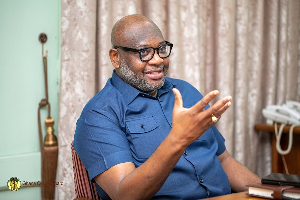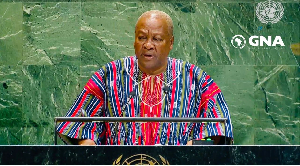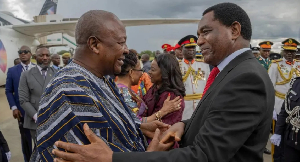By Dr. Hene Aku Kwapong, The Songhai Group
I have no idea when the word "revert" as in "I will revert" ever became so pervasive in offices throughout Ghana and came to mean "I'll get back to you", but I am hearing it a lot. So, naturally I became a little concerned when I called to ask a friend what he thought about an upcoming discussion. His short answer, "I'll revert". Revert to what? Things revert to previous state or status and I had no idea what he was communicating, but it raises an interesting aspect of how habits travel through our society especially the business sector, where clarity in communication is essential.
Bad habits die hard, but they sure get picked up like crazy and confuse the heck out of all of us. The same effect is at play when it comes to our dear currency, the almighty Ghana Cedi.
Years after the cedi was redenominated, we still have folks talking in terms of millions. Of course it can be deliberate when it appropriately gets a favorable perception especially when family gifting is being pursued. More concerning though is the confusion around the correct Cedi symbol to use (GHS versus GHC), all the way to an understanding of why the currency moves up and down. I wished we had chosen a capital C with a vertical line (?) as an abridged form, but I wasn't in the room when the decision was being made.
This Cedi Does Not Revert
How can the value of the GHS be both good and bad for Ghanaians at the same time? That is the general confusion that exists for the average Ghanaian. The confusion exists largely for 2 reasons; 1) lack of financial literacy which for the most part depends on level of literacy in numeracy, and 2) our institutions, including banks, do a poor job explaining the day-to-day economic issues to the rest of us. As a result, we end up with dwarf stories filling in the gap and sucking up all the air on our airwaves. So, the confusion persists.
Currencies generally behave like every other good and are governed by supply and demand. Assuming for a moment that tilapia was our (Ghana) currency and rice was the currency of the USA. Then if we need a certain amount of rice, we will have to fish for enough tilapia to exchange for an equivalent amount of rice negotiated with the USA. So, if we need more rice than we have fish to exchange, then we would get more rice, but we will owe the USA. That amount we owe is what is called the trade deficit. The question is who is supposed to pay for that deficit gap so we can continue to enjoy our rice? The good news is we go through seasons and so at times we catch more fish than needed. Also at times we don't eat so much rice so we don't always need same amount of rice. So guess what? Our exchanging of fish for rice creates deficit and also surpluses where the USA is not able to give us enough rice in exchange for the fish they need. So, while we may be having a deficit one moment, we typically revert back to surpluses over time. That is how normal markets work.
The value of a currency can be viewed from a domestic as well as an international perspective. Domestically, we use measures such as the consumer inflation to measure changes in the purchasing power of the GHS over time. When the inflation increases, we say that the GHS is buying less--the value or purchasing strength of the GHS is going down. If inflation is relatively stable, we say that the value of the GHS is stable. For some products with falling prices, we can even say that the purchasing power of the GHS is increasing.
Even though the GHS may be stable domestically, the value of the GHS could be rising or falling as measured by another country's currency. In those cases, a currency is a commodity. It is something that has a price and is bought and sold in order to be used. The medium of exchange used to purchase this
commodity is the currency of another country. The GHS, in that perspective, is purchased by foreign citizens who will, in turn, use it to purchase Ghanaian Goods and services or GHS-denominated assets such as Treasury bills, corporate bonds, or stock.
The problem with our Cedi is that, it has no such seasons of equivalent surpluses to revert to. Ever since I have known this country, we have always imported (brought from abroad) more goods from other countries than we have exported (sold abroad) Ghanaian goods. So, we have run a perpetual trade deficit. The question therefore is who is supposed to pay for this trade deficit?
Motherland Got No Rich Daddy
Unfortunately, Ghana has no rich uncles like Israel has in the US, so no country or institution like the IMF is going to give us free money for us to import more stuff that we sell to others outside. Unfortunately, wearing batakari and promoting buy Ghana-made to Ghanaians is a bit useless. If the Russians, the Chinese, and the Swiss are not willing to try on batakari, then we better learn how to sell them something else they love to buy. The deficit can be paid for from cash coming from other sources. We either continue borrowing money from outside or we have to create an environment conducive for others outside to bring capital (investing money) into the country to invest or buy bonds we issue. I'll explain below how that affects the value of the Cedi.
So, given the fact that we have this perpetual deficit, what happens if our government also has a larger budget that is resulting in spending more money than it is getting in revenue? That creates a second deficit, what economists call a budget deficit. Again, who is going to pay for that overspending?
So, here we are, finding ourselves running a twin set of deficits and who is going to pay for it? The fact is running perpetual twin deficits is a sure bet to make citizens of Ghana poorer.
Consider this; Malaysia has 30 million people and produces a GDP of $327 billion, Singapore has only 6 million people and produces GDP of $308 billion, and South Korea (in 1960, Ghana's per capita income was higher than South Korea) has 50 million and produces a GDP of $1,410 billion. All these countries run surpluses that feed their competitiveness and provide the capital pipeline to fund incredible development.
Let me use examples closer to home of countries that run surpluses; Nigeria has 178.5 million people and produces a GDP of $568 billion, Botswana has 2 million and produces a GDP of $16 billion, and Angola has 22 million and produces a GDP of $131 billion. The currencies of these countries revert to a long-term mean and go through cycles like our rice example above.
Unfortunately, our homeland Ghana has 26 million strong, runs a perpetual trade deficit and produces a GDP of $39 billion. The question is what will happen if we send the 26 million Ghanaians to Angola and the $22 million Angolans to Ghana? We will never know.
However, for Ghana to have a GDP comparable to that of Malaysia as our population gets closer to 30 million, will mean the country will need a revenue base of about $150 billion, a jump of about $140 billion from the current $10 billion. That is going to happen only by the private sector growing and learning how to sell products to external markets. No one is going to get there selling to brothers and sisters at home. This is why The Songhai Group and I have been so focused on helping companies find markets and capital outside Ghana.
How Does GHS Value In Other Countries Help Us?
For us to begin to understand the implications of the Cedi's lack of reversion to a natural long-term mean, we have to stop worrying about the absolute value of the Cedi in country and begin to get our heads around its value in the countries we trade with the most.
Strong is good. Weak is bad. These generalizations sound simple enough, but they can be confusing when talking about currencies. Is a strong GHS always good? Is a weak GHS always bad? Here is how the GHS and foreign currencies affect each other and how their interaction affects you and the economy.
The terms strong and weak, rising and falling, strengthening and weakening are relative terms in the world of foreign exchange. Rising and falling, strengthening and weakening all indicate a relative change in position from a previous level. When the GHS is "strengthening," its value is rising in relation to one or more other currencies. A strong GHS will buy more units of a foreign currency than previously. A weak GHS will buy less.
One result of a stronger GHS is that the prices of foreign goods and services drop for Ghanaian Consumers. This may allow Ghanaians to take the long-postponed vacation to some foreign destination, or buy a flashy Gucci bag that used to be too expensive.
Ghanaian Consumers benefit from a strong GHS, but Ghana exporters are hurt, meaning it contributes to the problem of the trade deficit. A strong GHS means that Ghanaian Goods and services are more expensive for foreign consumers who, as a result, tend to buy fewer Ghana products. Because it takes more foreign currency to purchase strong GHSs, any product priced in GHSs is more expensive abroad. A weak GHS also hurts some people and benefits others.
When the value of the GHS falls or weakens in relation to another currency, prices of goods and services from that country rise for Ghanaian Consumers. Because it now takes more GHSs to purchase the same amount of foreign currency to buy goods and services, Ghanaian Consumers and Ghana companies that import products have a reduced purchasing power.
At the same time, a weak GHS means prices for Ghana products fall in foreign markets, benefiting Ghana exporters and foreign consumers. With a weak GHS, it takes fewer units of foreign currency to buy the right amount of GHSs to purchase Ghanaian Goods. As a result, consumers in other countries can buy Ghana products with less money. Ideally, the GHS and all other nations’ currencies should be valued at a level that is neither too high nor too low. The problem is our persistent twin deficits means the Cedi will weaken over the long-term unless the structure of the economy is changed.
An interesting aspect of foreign exchange is that a currency may be strengthening but still may not be strong relative to its historical position. For example, if the USDGHS (meaning number of GHS to USD, dollar) were to go from 4.0 per dollar to 3.5 GHS to dollar, it is strengthening. However, because the GHS historically has been around 2.5 dollar, it is still not "strong." Likewise, a GHS that falls to 4.0 to dollar from 3.5 to dollar, it is weakening, but certainly not weak by historical comparison. Unfortunately, for our case there is not a historical level because the GHS has always gone one side, getting weaker and weaker always.
A Blessing Needed, In Disguise
The rising demand for GHS-denominated assets, such as real-estate and stocks, over the past years has had a negative effect on our economy. The stronger GHS increased the attractiveness of foreign goods in Ghana, making many price-conscious Ghanaian consumers respond by purchasing more imports and fewer domestic goods. This did help keep inflation under control. But at the same time, Ghana exports were more expensive to foreigners who tended to buy fewer Ghanaian Goods from an already limited world of goods we have to offer. As a result, the trade deficit widened as Ghana exports decreased and Ghana imports soared. The increasing demand for the dollar and other currencies vis-à-vis the GHS led to a weakening of the GHS.
As currencies become too strong or too weak, they tend to distort a country's competitiveness and that's no different for our economy and what we produce for export. As we have seen, the strong GHS of the early years of revaluation distorted the competitiveness of Ghana producers in relation to foreign producers.
In recent past after debt-forgiveness, many sectors of the Ghana economy were borrowing heavily with Government, corporations, and individuals all increasing their reliance on credit. This created strong demand for money to lend to borrowers. Typically, money saved by consumers is used to help meet such demand. Unfortunately, savings rates in Ghana are very low. Consequently, the money for Ghana borrowing had to come from somewhere. Funds from abroad helped to meet the demand. This rise in demand increased the price (interest rates) of GHSs. This, in turn, made it more attractive for foreign investors to hold GHSs.
All of these trends combined to make interest rates high for investors and borrowers. The relatively high interest rates enabled investors to earn better returns in Ghana than elsewhere. The increased demand for Ghana investments helped maintain a stable level for the GHS until the 2008 financial crises happened. Unfortunately, the funding spigot got turned off right when the rampant power crises began to move from our bedrooms to the factories of production, adding to an already worsening investment environment. That may have been a blessing in disguise that has set us on a path to a weakening GHS and now providing an opportunity for us to deal with the persistent structural problem in our trade with other countries.
Pain Now or Pay Later
While the increase in the supply of funds extended by foreign investors helped finance the budget deficit and helped keep interest rates below what they would have been without foreign capital, we now have high interest rates in place trying to attract the same capital that kept us on a binge. In the past GHS were in high demand for a number of reasons. Among these was the desire of foreign citizens to buy Ghana financial securities such as Treasury bills and bonds, corporate bonds, and other Ghana assets.
We now have been forced to seek IMF funding to close the gap, but that unfortunately is not a solution to Ghana's competitiveness and fixing the one-sided trekking of the GHS. We can delay the eventual reckoning with temporary inflow of borrowed money to keep social peace, but the day of reckoning will come if not addressed through improving terms of trade.
The long-term way to fix the structural problem and deal with the one-sided weakening of the GHS is to not artificially prop up the GHS, but to allow that to serve as motivation for Ghanaian companies to streamline their operations and increase productivity. In the long term these changes benefit the companies, make them more competitive, able to sell goods that other countries love to buy, and benefit the Ghana economy.
Greece has 10 million people, producing a GDP of $200 billion, with about $120 billion in Government revenue. The problem is they spend over half of their GDP, more than revenue taken in, on government expenditures and not enough to pay off a debt of about $375 billion. A debt at that level basically means the 10 million people have to work enough to payback an amount equal to what it takes to care for Malaysia's 30 million people. Unfortunately, the Greeks do not have a currency that can weaken and offer the motivation to get off their binge on importing more than they can afford. So, they are left with either their private sector stepping in to export their way out of debt or, in a monetary union, continue to borrow from a central bank they do not control.
Our motherland is no Greece and we have a currency, the mighty GHS. So let's sacrifice and make the hard decisions to create the structures for the GHS to have a mean to revert to.
Dr. Hene Aku Kwapong can be reached via mail at oak@songhai.com and will be leading The Mastering Business Execution and The Sales Strategy & Execution events by The Practice School at the Fiesta Royale Hotel, Accra, 1st week of August.
Opinions of Saturday, 25 July 2015
Columnist: Kwapong, Hene Aku














